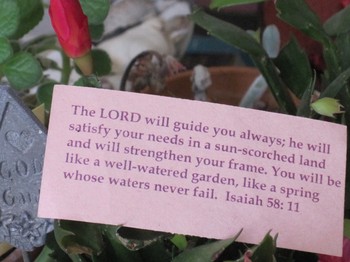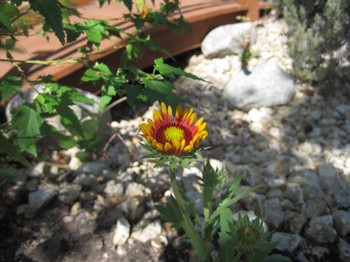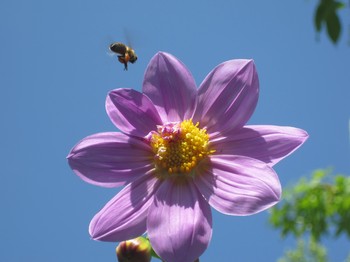Seeing without categorizing
 Drought dominoes
Drought dominoes
What growing a garden in drought-stricken California has to do with the church
by Anita Coleman
The Lord will guide you continually and satisfy your needs in parched places and make your bones strong; and you shall be like a watered garden, like a spring of water whose waters never fail. —Isaiah 58:11
“Your lawn looks green,” my new neighbor complimented me recently. “We are new homeowners, and we don’t yet know how to keep our lawn green. I am sorry. Please forgive me. I am so ashamed of our brown grass.”
This was our first real conversation, and I wondered how to respond. I had come to know her four boys when dropping off cookies and cakes, but I’d never had the chance to talk with the parents. They were always busy. The children, I noticed, were listening. Perhaps I should tell them my story of “drought dominoes,” I thought.
“Would you like to see my garden?” I asked. “I call it the Garden of Grace.”
As we walked over to my house, I began my story.
“When we first came here to California, my husband and I soon became aware that we were moving into a coastal desert area. Most of our water is imported. If any one thing went wrong—say, the rains failed, or the politicians disagreed, as they often do—our groundwater would be depleted and our water supply jeopardized. California produces a lot of our fruits and vegetables. Prices would go up. Water would become scarce and there might be water cuts and rationing. Also, as the world’s population grows, the need for fresh water is growing. Fearing this domino effect, we felt that water was a precious resource to conserve and use carefully.”
 “That is so true!” my neighbor exclaimed. “Our family is originally from Vietnam, which has lots of wet tropical areas. But drought is one of the most common natural disasters. Do you know about the 2012 Mekong Delta drought? Riverbeds dried up, forests caught on fire, and over 50,000 paddies were affected. I never imagined it could happen in America. California is the golden state. It is richer than many countries even! I always thought it was the right of every American to have a home with a white picket fence and a green lawn.”
“That is so true!” my neighbor exclaimed. “Our family is originally from Vietnam, which has lots of wet tropical areas. But drought is one of the most common natural disasters. Do you know about the 2012 Mekong Delta drought? Riverbeds dried up, forests caught on fire, and over 50,000 paddies were affected. I never imagined it could happen in America. California is the golden state. It is richer than many countries even! I always thought it was the right of every American to have a home with a white picket fence and a green lawn.”
“Yes,” I responded. “Few people, we included, ever thought California would suffer a drought. I grew up in south India, in the tropics, where it rains a lot. Still, there were water shortages every summer. I saw people waiting daily, for hours in long water lines, to get a few containers of water. We realized that could also happen here.”
“A combination of other things—globalization and the Internet, to name two—made us realize that the days of living in regional or national bubbles are gone. How we live in the United States has an impact on the health of our planet and people everywhere. We wanted to be good global citizens; think global, act local! And, so our adventure began. Now, in the middle of a bad drought we’re enjoying far more good things than just a green lawn.”
“We started by installing smart appliances such as water-saving shower heads; low-flush, water-conserving toilets; drip irrigation; and a computer-based irrigation controller which varies the watering times of our garden based on the latest weather report.”
“My neighbor pointed to the tall trees that gifted our little suburban garden with privacy. “Your water bill must be huge,” she said. “My husband just cut all our trees.”
 “That’s one of the nice things that’s happened,” I replied. “As we learned to treasure water, we began to understand the value of the trees. These are liquid amber trees. They are almost 40 years old. They give us dramatic fall color, which is a rare sight in Southern California, and they clean the air by absorbing a lot of the carbon dioxide. They don’t need watering. See the permeable walkways and bio-swale? Well, gutters on the roof channel the rain water into the swale,” I said, pointing to the dry stream bed which ran through the garden.
“That’s one of the nice things that’s happened,” I replied. “As we learned to treasure water, we began to understand the value of the trees. These are liquid amber trees. They are almost 40 years old. They give us dramatic fall color, which is a rare sight in Southern California, and they clean the air by absorbing a lot of the carbon dioxide. They don’t need watering. See the permeable walkways and bio-swale? Well, gutters on the roof channel the rain water into the swale,” I said, pointing to the dry stream bed which ran through the garden.
“The bio-swale collects rain water and recharges the lake underground. In fact, because we don’t have hardscape, all the rain goes into the ground. Polluted rain water doesn’t run-off into the oceans. Micro-organisms in the soil clean the toxic chemicals in the rain water. The roots of the trees, vegetable beds, rose bushes, and fruit trees, are all nourished by this rainwater. Now, we enjoy homegrown flowers, greens, vegetables, and fruits year round! And, the herbs attract bees, butterflies, and hummingbirds—it is such fun to watch their interactions help the garden grow!”
The boys were playing on the bridge over the swale, and I concluded my story.
“I’ve even written the story of that bridge over the swale in a children’s book, Path of Grace. It has pictures from this garden. So you see, California’s drought has shown me my true treasures—the air, water, soil, trees, and my relationships with them and all of creation, including other human beings. This is just one reason why we call this the Garden of Grace. Our family is being rewarded and satisfied in far more ways than the American dream of owning a home with a picket fence and a green lawn.”
At the time, it was just a conversation between neighbors. Since then, it has become for me a parable about the church.
 This summer will mark for me nine years with the Presbyterian Church (U.S.A.). During that time, I’ve heard a lot about droughts in the church. More and more Presbyterians seem to be watching their lawns wither and their faucets dry up. If a congregation appears to be blooming, people are quick to ask what program, lucrative fundraising, PR campaign, young adult ministry, or innovative leader achieved this success.
This summer will mark for me nine years with the Presbyterian Church (U.S.A.). During that time, I’ve heard a lot about droughts in the church. More and more Presbyterians seem to be watching their lawns wither and their faucets dry up. If a congregation appears to be blooming, people are quick to ask what program, lucrative fundraising, PR campaign, young adult ministry, or innovative leader achieved this success.
Their questions reveal, I believe, a misunderstanding of what we as a church are most missing. The most deadly drought facing us today is not programs or youth; it is a lack of followers who practice faith in their daily lives, the kind to which the prophetic tradition in Isaiah calls.
Isaiah 58 tells us that neighbor love is a precondition for the promise of a “well-watered garden” (v.11). God calls us to a fast, to stand in solidarity with the oppressed and the needy. Imagine it. We would consume less and be kind more. We would reach out to the poor and those who don’t look like us and build authentic friendships. We would have less of an appetite for worldly living and more for spiritual athleticism (Eph. 1 and 4). We’d treasure our spiritual blessings by living in God’s economy of grace and sowing its seeds in our capitalistic society a little bit at a time. We’d not rely solely on professional pastors and denominational leaders to be the hands and feet of Jesus in our world. We’d be those hands and feet. We’d bloom where we’ve been planted, humbly and quietly.
When we faithfully do these small, seemingly insignificant, daily acts of echoing Jesus, our God—who fed our spiritual forebears with manna and a crowd of five thousand with a few loaves of bread and fish—will nourish us with the wellspring of Jesus. Church will be a well-watered garden growing in a parched land.
Conversation starters:
1) The Bible is filled with powerful garden metaphors. What lessons can we draw from the parable of the mustard seed for the church today?
2) Is there anything scarce in the church today? How about our practice of Christian discipleship?
3) Why do you think Jesus came to live as a poor man in an oppressed country?
4) What do you think solidarity with the hungry and oppressed means for you, personally?
5) How will a fast from a materialistic lifestyle—a smaller home, sharing a car, traveling less—help you practice the kind of religion that God likes?
Anita Coleman is a wife, mother, and writer who enjoys electronics, gardens, and books.
References:
Famiglietti, Jay. March 2015. (Op-ed.) California has about one year of water: Will you ration now? LA Times. Available online. http://www.latimes.com/opinion/op-ed/la-oe-famiglietti-drought-california-20150313-story.html Last retrieved July 18, 2015
United Nations-Water Activity Information System. http://www.ais.unwater.org/ Last retrieved July 18, 2015 (for a report on drought in Vietnam)
US Drought Monitor. Available online. http://droughtmonitor.unl.edu/ Last retrieved July 18, 2015 (Map of droughts in the US)